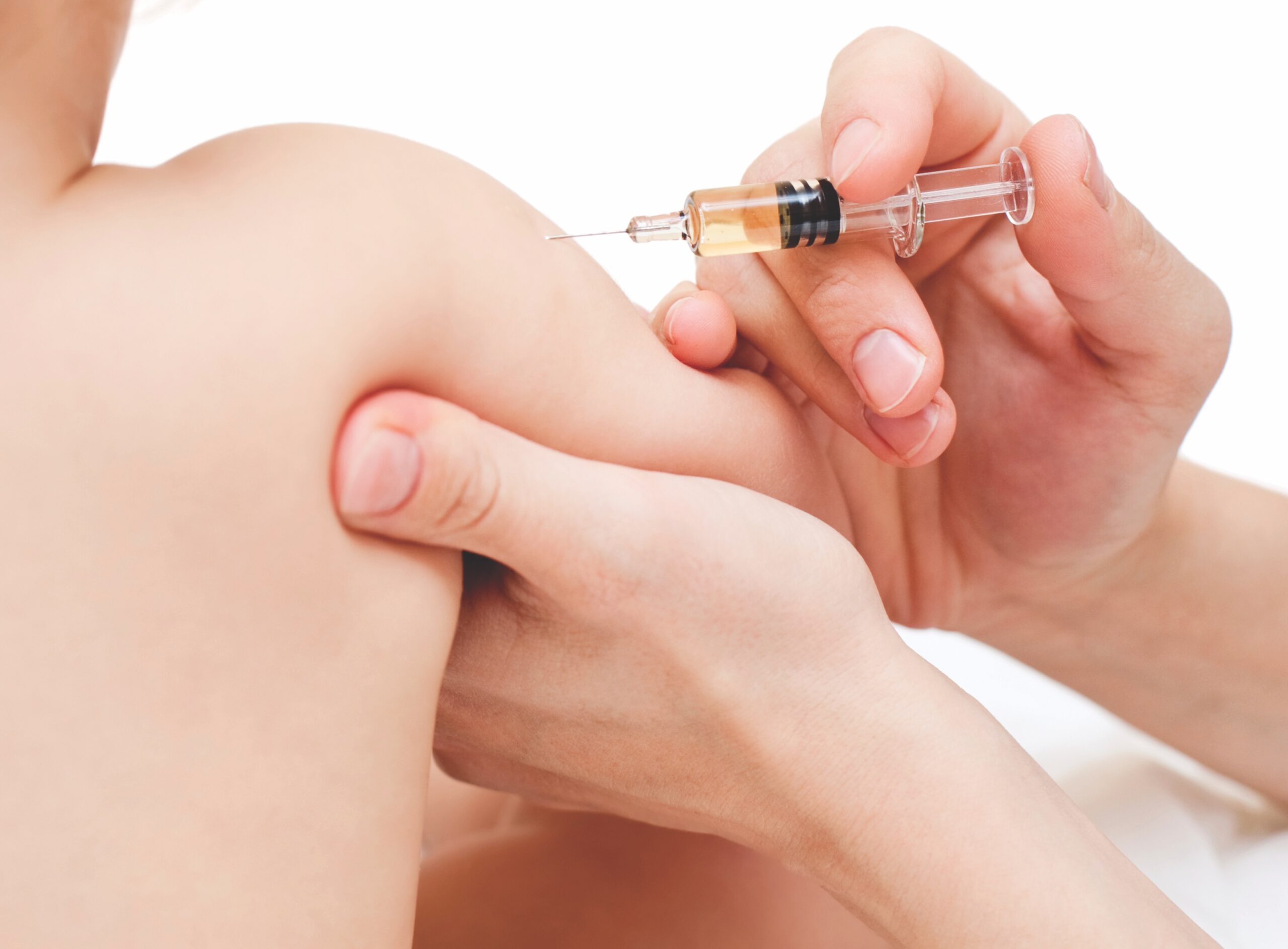It started as a gut feeling for Marnie Davidson. When her daughter was born almost two decades ago, Davidson made a firm decision: she wouldn’t be vaccinating. It’s a philosophy she’s stuck to over the years. Her daughter, now 18, and her two-year-old son have not received any of their recommended shots.
Davidson admits to me that despite her longstanding belief, she only started researching vaccines a couple of years ago. Now, she says, her views are backed up by facts. With her daughter, it was an instinct. How could poking a needle into a perfectly healthy baby make her better off?
Davidson isn’t alone in her skepticism, especially when she sticks close to home. Her community of West Kootenay, B.C., has some of the lowest immunization rates in Canada. She estimates that nearly half of the children in her community are unvaccinated.
Although the immunization rates in the rest of the country probably aren’t as low as what Davidson has experienced, it’s hard to know for sure: up-to-date nationwide vaccine data doesn’t exist. A 2013 UNICEF report states Canada has an 84 percent vaccination rate — one of the lowest among the world’s developed countries — but the federal government maintains that it’s closer to 95 percent.
Some doctors, including the Canadian Paediatric Society, say there’s little doubt the number of vaccinated children is dropping nationally. They point to recent outbreaks — such as a spike in measles cases this year — as evidence that more and more families are opting out of immunization.
Even our political leaders are speaking up. In June, Prime Minister Stephen Harper told a CBC interviewer that he doesn’t understand why some people in the developed world don’t vaccinate their kids. “Don’t indulge your theories; think of your children and listen to the experts,” he admonished.
At a time when vaccines have a proven track record, it’s hard to understand why anyone would refuse to vaccinate their kids. But non-vaccinating parents tell me they’re protecting their children from harm — a harm they feel is very real.
The reason outbreaks occur, experts say, is because of damaged “herd immunity”: the collective immunity a society achieves if about 95 percent of its population is vaccinated.
“If every child in Canada who could be immunized was, the chance is much less likely that [disease] would spread,” says Dr. Joan Robinson, chair of the infectious diseases and immunization committee at the Canadian Paediatric Society.
Vaccines don’t have a 100 percent effectiveness rate, meaning that some among us are unknowingly unprotected. Robinson notes that certain children, such as transplant patients, don’t receive vaccines due to weakened immune systems, and rely on herd immunity for protection. The more unvaccinated people there are, the more our herd immunity is at risk.
Anti-vaccinationists, on the other hand, make a case for going natural. The three non-vaccinating mothers I spoke to each believe that vaccines cause outbreaks. This, they say, is because vaccines give us an unnatural immunity that eventually wears off. Instead, if we all caught the diseases and fought them off, we’d develop a natural, lifelong herd immunity.
Davidson actually hopes her kids get sick — so they can jump-start their natural immunity building. Whereas childhood diseases were once commonplace, she says, “we now have this idea in our heads that things like the measles and the mumps and chicken pox are such a bad thing to get.” In her eyes, they’re not. The Public Health Agency of Canada counters that the diseases vaccines prevent can kill and disable children.
Another non-vaccinating B.C. mother, Megan Purnell, tells me she hasn’t seen evidence that vaccines are safe or even helpful. Like Davidson, she feels they aren’t the best way to eradicate disease and is also against doing anything unnecessarily invasive to her children.
Purnell, who lives in Kelowna, started researching immunization when she discovered that none of her husband’s close relatives, including him, had ever been vaccinated.
“I’ve probably read something on vaccines every day for five or six years,” she says. “I have hundreds of pages printed. I have hundreds of links I’ve saved.”
Purnell’s children, a two-year-old daughter and a six-month-old son, haven’t been immunized, and she plans to keep it that way.
She says the pro-vaccine science isn’t enough to convince her to change her views and that there’s a lack of peer-reviewed, independent studies proving immunization to be beneficial.
The World Health Organization, however, says that about 1.5 million children under five die each year, mostly in developing countries, from diseases that vaccines could have prevented. And the Paediatric Society’s Robinson points to measles as an example of how effective vaccines can be. After the vaccine was introduced in Canada during the early 1970s, the number of measles cases dropped dramatically. Since a second routine dose started being given in 1996, the disease has been nearly eradicated.
It’s hard to totally disparage the outliers among us. After all, the medical and pharmaceutical industries don’t have a perfect record.
But with vaccines, the prevailing thought is that they’re far safer than the diseases they prevent. And the risk of side effects is low. According to Public Health Ontario, of the 7.8 million vaccine doses distributed in the province in 2012, there were 631 adverse reactions reported. Most were mild — sore arms, fevers, rashes — but 56 people reported serious reactions such as seizures, encephalitis, anaphylaxis and Guillain-Barré syndrome, a disease affecting the nervous system. No one died.
The Public Health Agency of Canada doesn’t track the number of vaccines administered but gets anywhere from 3,000 to 4,500 adverse event reports a year. Less than 10 percent of these are serious, requiring admission to hospital.
Despite the low risk, a small community of parents in Canada is very concerned about vaccine reactions. The Vaccine Risk Awareness Network (VRAN), based in B.C., operates mostly online with a shoestring budget and around 500 members. It advocates for better vaccine safety and more government transparency regarding immunization.
Like Davidson and Purnell, VRAN co-founder Edda West, a mother of three adult children, asserts that vaccines have not significantly reduced death from infectious diseases. But she’s more concerned about patient safety, maintaining that vaccines are routinely given with little or no warning of the risks involved.
The Public Health Agency of Canada’s immunization guide states that prior to immunization, the vaccine provider should give “pre-vaccination counselling,” which includes reviewing the risks and benefits of vaccines, and discussing the “frequently occurring minor adverse events and potential rare severe adverse events.”
In West’s experience, this rarely happens. “Unless people have heard ahead of time that there are problems with vaccines, they just accept it at face value that ‘Oh, this is what I’m supposed to do.’”
Although the Public Health Agency of Canada developed the guidelines, it’s up to provincial authorities to enforce them.
Many VRAN members are parents of children who have reacted badly to vaccines. Others are simply concerned about the risks.
VRAN criticizes the Canadian government for not having a public, online, searchable database documenting each vaccine injury. The United States has the Vaccine Adverse Event Reporting System, run by federal government agencies. It receives around 30,000 reports a year, mostly documenting non-serious side effects.
VRAN advocates for a similar system to be set up in Canada. Right now, there’s a formal reporting process that involves the Public Health Agency of Canada and its provincial counterparts, but individual case data aren’t made public. Instead, the agency releases quarterly reports with compiled data.
“Basically, they keep the information to themselves,” West charges. “And this is very handy for them, because if the information isn’t released, they can’t be challenged on the position that vaccines aren’t causing problems.”
VRAN is also advocating for a national compensation plan to help those with debilitating vaccine injuries. Canada is one of only two G8 countries (along with Russia, before its G8 membership was indefinitely suspended) that doesn’t offer a no-fault compensation program for affected families. The U.S. program adds a $0.75 tax on each vaccine administered to cover the program costs. This allows families to be compensated and for drug companies to continue to manufacture vaccines without the fear of lawsuits.
It’s unclear why the Canadian government has opted against running a national compensation program. When asked, a spokesperson at the Public Health Agency of Canada provided a statement saying that injury compensation is under provincial and territorial jurisdiction, and therefore not a national issue. Quebec, in fact, is the only province that runs its own no-fault compensation program, which has been in place since 1986.
Three years ago, researchers at the University of Toronto published a report arguing that Canada has an ethical obligation to set up a national compensation program for the rare injury victims, as the federal government makes a point of widely encouraging vaccines.
West maintains that when a Canadian child is harmed by a vaccine, no one takes responsibility. “It basically falls on the shoulders of the parent,” she says.
They’ve been called “clueless,” “quacks” and “crazies.” It’s no secret that anti-vaccinationists (known as “anti-vaxxers” by their opponents) are often vilified. And it makes sense: if you believe in the power of herd immunity, non-participants are a threat to your well-being.
“It’s grim. It feels like warfare,” West tells me.
But these parents might not fit the demographic you’d think. An American study from 10 years ago shows that most unvaccinated children have mothers who are married, college educated and have a household income of over $75,000 a year. Davidson and Purnell, for example, are articulate and thoughtful and obviously care a lot about their children.
Not all anti-vaccinationists have the same motives either. While some have seemingly legitimate concerns about government and doctor transparency, others rely on discredited medical research to back up their beliefs — the most notorious being Andrew Wakefield’s 1998 study in the Lancet medical journal linking the vaccine for measles, mumps and rubella to autism. Years later, in 2010, the journal retracted the study after much of the information was found to be false. Wakefield was also stripped of his medical licence. Despite this, some anti-vaccinationists, including West, believe his research to be true.
What’s behind this distrust of the medical establishment? According to Margaret Somerville, founding director of the McGill Centre for Medicine, Ethics and Law, we once put total faith in medical professionals, assuming they knew best. Now, information flows freely online, and consequently it’s the doctors who have to earn our trust. “There’s not this information deferential that we used to have in the past,” Somerville says.
Another theory is that parents are influenced by frightening anecdotes, even when no definite link has been made between the vaccination and a subsequent illness. A child’s seizure might have happened anyway.
When I suggest to West that opposition to vaccines could be based on anecdote, she gets noticeably irritated. “Calling it anecdotal is really an insult,” she says. “You’re using terminology that the pro-vaccine side uses to discount the injuries that happen to children.”
In most provinces, immunization is not required for public school admission. In Ontario and New Brunswick, however, the parents of unvaccinated children must sign a document claiming an exemption for medical, religious or moral reasons.
This small hurdle may be the only realistic step provincial governments can take. While some doctors might wish to make vaccines mandatory, immunization by force would be no easy task. I ask Davidson whether there are any circumstances — like school suspension — that might make her consider vaccinating. “You can put me in prison, and I still wouldn’t vaccinate,” she replies. “And you can quote me on that one.”
Davidson isn’t the only anti-vaccinationist digging in her heels. A recent study by the medical journal Pediatrics suggests that traditional vaccine-promotion tactics used by public health units have no effect on changing some parents’ minds.
It seems that if government officials want to increase immunization rates, they’re going to have to shift their approach and offer the skeptics more empathy, engagement and transparency.
Meanwhile, doctors continue to hope that with enough discussion, information and a growing relationship of trust, some anti-vaccination parents will reconsider. In this impassioned debate, it may be the best they can expect.
Alison Shouldice is a journalism student at Ryerson University in Toronto. She was The Observer’s summer intern.
***
This story first appeared in The United Church Observer’s September 2014 issue with the title “Sore point.”















